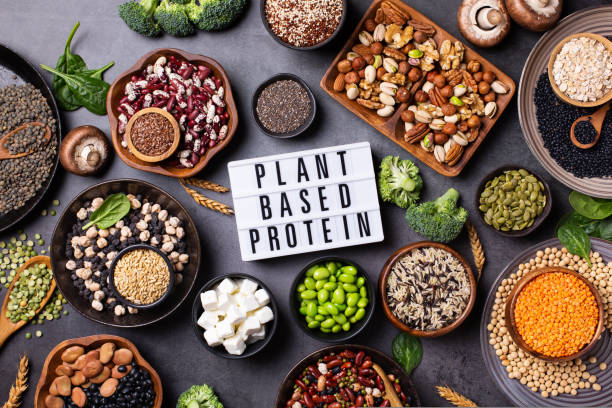he rise of plant-based diets and the emergence of plant-based protein alternatives have sparked an ongoing debate about whether these alternatives can effectively replace meat in our diets. It’s a topic that touches upon issues of nutrition, sustainability, and personal choice.
The Nutritional Aspect
1. Protein Content
One of the central questions in this debate is whether plant-based protein can provide an equivalent amount of protein as meat. The answer is yes. Plant-based sources such as legumes, tofu, tempeh, and seitan offer substantial protein content. Additionally, advancements in plant-based meat substitutes, like the Beyond Burger and Impossible Burger, aim to mimic the taste and texture of real meat while delivering a comparable protein punch.
2. Essential Nutrients
Plant-based sources also contain essential nutrients, including vitamins, minerals, and dietary fiber. For instance, legumes are rich in iron and folate, while leafy greens like spinach and kale provide essential vitamins and minerals. Moreover, many plant-based protein sources are low in saturated fats, making them heart-healthy choices.
3. Fiber Benefits
Plant-based diets tend to be higher in dietary fiber, which can have various health benefits, such as improved digestion, lower cholesterol levels, and better weight management. Meat is devoid of dietary fiber, making plant-based diets an attractive option for those aiming to increase their fiber intake.
The Environmental Argument
1. Reduced Greenhouse Gas Emissions
One of the main reasons people consider plant-based diets is their potential to reduce greenhouse gas emissions. The livestock industry is a significant contributor to greenhouse gas emissions, and transitioning to plant-based protein sources can help mitigate this environmental impact.
2. Land and Water Conservation
Producing plant-based protein typically requires fewer resources than meat production. Growing crops for plant-based diets is often more efficient in terms of land use and water consumption. This efficiency can reduce deforestation and water scarcity issues associated with meat production.
3. Biodiversity Preservation
Reducing our reliance on animal agriculture can help protect biodiversity by minimizing habitat destruction and the demand for monoculture crops. Plant-based diets can be more in line with sustainable and regenerative farming practices.
The Ethical Concerns
1. Animal Welfare
One of the most prominent arguments for plant-based protein is its alignment with animal welfare concerns. The conditions in some industrial-scale meat production facilities have raised ethical questions about animal treatment. By choosing plant-based protein, individuals can reduce their contribution to such practices.
2. Reduced Suffering
For those who are concerned about the suffering of animals, plant-based diets offer a cruelty-free option. Plants don’t experience pain or suffering in the way animals do, making plant-based choices an ethical alternative.
The Versatility of Plant-Based Diets
1. Culinary Creativity
Plant-based diets inspire culinary creativity. A wide variety of cuisines and dishes from around the world are primarily plant-based. These diets encourage experimenting with unique ingredients, herbs, and spices to create delicious and satisfying meals.
2. Inclusivity
Plant-based diets are inherently inclusive. They can cater to individuals with dietary restrictions, allergies, or ethical beliefs. By embracing plant-based protein, you can provide diverse and inclusive meal options for a broader range of people.
The Argument for Balance
While plant-based diets offer numerous benefits, some argue that a balanced approach is the most practical solution. A diet that incorporates both plant-based and animal-based protein can provide a well-rounded nutritional profile while addressing sustainability and ethical concerns.
Challenges and Considerations
1. Nutrient Gaps
Plant-based diets may require careful planning to ensure that all essential nutrients are adequately covered. For instance, vitamin B12, predominantly found in animal products, may need to be supplemented or obtained from fortified foods in a plant-based diet.
2. Availability and Cost
The accessibility and affordability of plant-based protein sources can be a concern in some regions. Meat alternatives can also be more expensive than conventional meat products. This presents a barrier to entry for some individuals.
3. Individual Choice
Ultimately, the decision to replace meat with plant-based protein is a personal choice. It depends on individual dietary preferences, cultural influences, and ethical beliefs. People have the freedom to make choices that align with their values and lifestyle.
In Conclusion
The question of whether plant-based protein can replace meat is multifaceted and subjective. From a nutritional standpoint, plant-based protein can certainly provide essential nutrients and protein content. Additionally, plant-based diets align with sustainability and ethical concerns, offering an eco-friendly and cruelty-free alternative. However, it’s essential to consider individual dietary needs, access to plant-based options, and personal beliefs. Whether you choose to embrace plant-based protein, consume meat in moderation, or adopt a flexitarian approach, the key is to make informed and mindful choices that best suit your health, ethical values, and environmental considerations.
